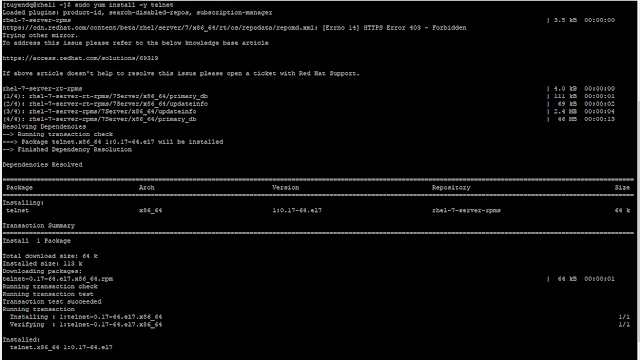telnet stands for "Teletype Network".
 |
| RHEL install telnet: yum install -y telnet |
telnet-ssl on Ubuntu
Before installing telnet-ssl, there is no -z options
tuyendq@2:~$ telnet -h
telnet: invalid option -- 'h'
Usage: telnet [-4] [-6] [-8] [-E] [-L] [-a] [-d] [-e char] [-l user]
[-n tracefile] [ -b addr ] [-r] [host-name [port]]
tuyendq@2:~$
tuyendq@2:~$ apt show telnet-ssl Package: telnet-ssl Version: 0.17.41+0.2-3build1 Priority: extra Section: universe/net Source: netkit-telnet-ssl Origin: Ubuntu Maintainer: Ubuntu Developers <ubuntu-devel-discuss@lists.ubuntu.com> Original-Maintainer: Mats Erik Andersson <mats.andersson@gisladisker.se> Bugs: https://bugs.launchpad.net/ubuntu/+filebug Installed-Size: 217 kB Provides: telnet-client Depends: libc6 (>= 2.15), libssl1.1 (>= 1.1.0), libstdc++6 (>= 5) Download-Size: 85.2 kB APT-Sources: http://us.archive.ubuntu.com/ubuntu bionic/universe amd64 Packages Description: telnet client with SSL encryption support The telnet command is used for interactive communication with another host using the TELNET protocol. . SSL telnet replaces normal telnet using SSL authentication and encryption. It interoperates with normal telnetd in both directions. It checks if the other side is also talking SSL, if not it falls back to normal telnet protocol. . Advantages over normal telnet: Your passwords and the data you send will not go in cleartext over the line. Nobody can get it with tcpdump or similar tools. With SSLtelnet you can also connect to https-server like https://www.mozilla.org. Just do 'telnet -z ssl www.mozilla.org 443' tuyendq@2:~$ sudo apt install telnet-ssl
After install telnet-ssl
tuyendq@2:~$ telnet -h
telnet: invalid option -- 'h'
Usage: telnet [-4] [-6] [-8] [-E] [-K] [-L] [-X atype] [-a] [-d] [-e char]
[-l user] [-n tracefile] [ -b addr ] [-r]
[-z ssl] [-z secure] [-z debug] [-z verify=int]
[-z cacert=file] [-z cert=file] [-z key=file]
[host-name [port]]
tuyendq@2:~$
telnet -z ssl smtp.gmail.com 465
tuyendq@2:~$ telnet -z ssl smtp.gmail.com 465 Trying 142.250.101.108... Connected to smtp.gmail.com. Escape character is '^]'. 220 smtp.gmail.com ESMTP t21sm4101108pfe.82 - gsmtp EHLO tuyen 250-smtp.gmail.com at your service, [173.82.240.78] 250-SIZE 35882577 250-8BITMIME 250-AUTH LOGIN PLAIN XOAUTH2 PLAIN-CLIENTTOKEN OAUTHBEARER XOAUTH 250-ENHANCEDSTATUSCODES 250-PIPELINING 250-CHUNKING 250 SMTPUTF8